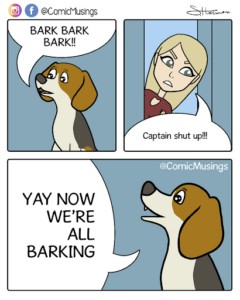Barking is a natural behavior for dogs, a fundamental way they communicate with their world and with us. While sometimes endearing, excessive barking can be frustrating and concerning. Understanding why your dog barks, particularly at you, is crucial to addressing the issue effectively. This article explores the common reasons behind this behavior and provides insights into how to manage it.
Barking: A Language of Its Own
Dogs can’t speak our language, so they rely on vocalizations like barking, whining, and growling to express their needs, emotions, and perceptions. Barking isn’t inherently “bad”; it’s simply a form of communication. Sometimes, your dog’s barks are conveying crucial information, such as alerting you to a potential danger or signaling a desire to go outside. Other times, barking can be a symptom of an underlying problem that needs to be addressed.
The Reasons Behind the Barks: Why Your Dog Barks at You
There are several reasons why your dog might be barking at you specifically. Identifying the root cause is the first step toward finding a solution.
Seeking Your Attention
One of the most common reasons dogs bark at their owners is to get attention. Even negative attention, such as scolding, can reinforce this behavior. Your dog learns that barking elicits a reaction from you, regardless of whether it’s positive or negative.
Expressing Excitement and Joy
Dogs, like humans, express joy and excitement. A sudden burst of barking can be your dog’s way of celebrating your arrival home, anticipating a walk, or simply expressing their enthusiasm for playtime.
Communicating Fear, Anxiety, or Aggression
Barking can also be a manifestation of fear, anxiety, or aggression. Your dog might bark at you if they feel threatened or uncomfortable in a particular situation. This type of barking is often accompanied by other body language cues like raised hackles, a tucked tail, or whale eye.
Alerting You to Discomfort or Pain
If your dog is experiencing pain or discomfort due to an injury or illness, they might bark at you to communicate their distress. Changes in barking patterns, coupled with other symptoms like lethargy or loss of appetite, should warrant a visit to the veterinarian.
Learned Behavior and Habit
Sometimes, barking becomes a learned behavior or habit. Your dog might have learned that barking at you gets them what they want, whether it’s a treat, a toy, or simply your attention. In other cases, there may be no clear trigger, and the barking seems to be a habit.
Underlying Medical Conditions
Certain medical conditions, including cognitive dysfunction syndrome (CDS) and sensory decline, can lead to increased vocalization in dogs. If your dog’s barking seems excessive or unusual, consult with your veterinarian to rule out any underlying medical issues.
Deciphering the Barks: Understanding the Context
Observing the context in which your dog barks at you is crucial to understanding the underlying reason. Consider the following:
- When does the barking occur? Is it when you’re eating, watching TV, or trying to leave the house?
- Where does the barking occur? Is it in specific locations or situations?
- What is your dog’s body language like? Are they wagging their tail, displaying aggressive postures, or appearing anxious?
Conclusion: Addressing the Barking
Understanding why your dog barks at you is the key to effectively addressing the behavior. While barking is a natural form of communication, excessive or problematic barking can often be managed through training, behavior modification, and addressing any underlying medical or emotional issues. If you’re struggling with your dog’s barking, consulting with a certified dog trainer or veterinary behaviorist can provide personalized guidance and support. They can help you decipher your dog’s language and develop strategies to create a more harmonious environment for both you and your furry friend.

